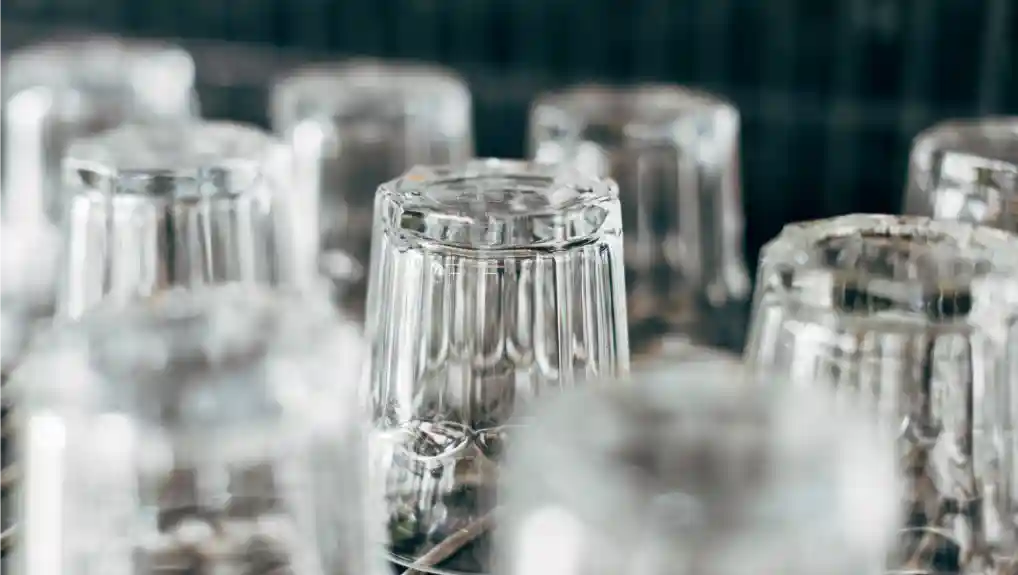In the UK hospitality industry, glassware safety standards are a must for both compliance and customer confidence.
You’ll need to use strong detergents and hot water to remove grease and kill germs without leaving residues behind.
Always handle glasses by the base or stem to reduce contamination risk and inspect each glass before use and discard any with chips or cracks.
Toughened or polycarbonate glasses for extra durability and safety in high risk areas.
Get your staff trained on these procedures, from cleaning to emergency procedures. More on this later.
Summary
- Clean glassware with strong detergents and hot water to kill germs and grease.
- Inspect glasses for chips or cracks regularly and remove damaged ones immediately to stay safe.
- Train staff to handle glasses by the base or stem to reduce contamination.
- Use shatterproof glassware like toughened or polycarbonate in high risk areas.
- Follow your local Environmental Health Officer and HACCP plan guidelines to meet legal and safety standards.
Cleaning and Hygiene
Keeping your glassware clean is key to meeting safety and hygiene standards in the hospitality industry.
Here are a few cleaning techniques to master.
- Choose the right detergent; strong enough to remove grease but gentle enough not to leave residues behind.
- When washing by hand use hot water as it kills germs better.
You need to ensure the rinse is effective too; glasses must be rinsed thoroughly to remove all soap residue as any left behind can affect the taste of drinks and be a health risk.
For high volume sites use a commercial glasswasher. These machines are designed for maximum sanitisation but must be maintained and used according to the manufacturer’s instructions to work effectively.
Always check the rinse cycle on these machines leaves no soap residue.
And finally hygiene doesn’t stop with the wash. You must wash your hands before handling clean glassware to prevent recontamination.
By following these guidelines your glassware will be sparkling clean and hygienically safe.
Handling and Service
When serving drinks always handle glasses by the base or stem to reduce contamination risk.
This grip ensures your fingers don’t touch the rim or inside of the glass, areas that come into contact with the customer’s mouth.
It’s important for serving hygienically. Always use a tray when carrying multiple glasses. This prevents breakage and reduces the risk of dropping glasses which can be hazardous in a busy hospitality environment.
When glasses are on a tray you’re better equipped to navigate through busy areas without incident. For refills make sure you follow a strict refill protocol.
Always provide a new clean glass for each new drink or refill.
This isn’t just about customer satisfaction; it’s a fundamental part of service hygiene.
Using the same glass without proper cleaning can transfer bacteria and spoil the drink’s taste. Also inspect each glass before use.
Chipped or cracked glasses must be removed from service immediately to avoid injury and maintain a professional standard of service. These are basics to meet the safety and quality expected in UK hospitality.
Glass Types and Materials
Now that we’ve covered handling and service techniques let’s look at the types of glassware used in hospitality. You’ll want to choose glass materials that improve the customer experience and safety.
Here are the key points to consider when choosing your glassware:
Toughened Glass:
This is treated to increase its strength and impact resistance. It will shatter into small harmless pieces if broken and meets the safety standard EN 12150-1:2015.
Polycarbonate Options:
For high risk of glass breakage polycarbonate glasses are shatterproof. They are virtually unbreakable and reduce the risk of injury.
Impact Resistance:
Glassware in busy hospitality environments should be able to withstand minor knocks and bumps. Toughened glass and polycarbonate are great for impact resistance.
Shatterproof Design:
Safety first and using materials that won’t break or shatter protects staff and customers.
Aesthetic and Practicality:
While safety is important don’t forget the glassware should also match your venue’s aesthetic and be practical for the drinks you serve.
Choosing the right materials will keep your hospitality environment safe, efficient and looking good.
Legislation
You need to know the legislation around serving drinks in hospitality.
There is no law that says you must use a new glass for each drink but food safety regulations state all open food and drink must be served in clean containers.
Following your HACCP plan is key as it may require you to use new glasses to mitigate health risks from cross contamination.
Glass reuse has cost implications but must be balanced against customer perception and industry standards which are hygiene and safety.
Local Environmental Health Officer may also require new glasses per drink so make sure you’re meeting their expectations.
You’ll find that high standards are not only legal but also build customer trust and satisfaction.
Making sure all glassware is clean minimises health risks and meets industry standards, ultimately protects your business’s reputation and bottom line.
Remember the cost of glassware safety is an investment in your business’s longevity and public image.
Be proactive in understanding and implementing these requirements to stay ahead in the competitive hospitality game.
Staff Training
Train your team in glassware safety to maintain high standards of hygiene and customer satisfaction.
You need to make sure everyone knows the best practices to reduce risks and protect your venue’s reputation.
Here’s how you can do that:
Safety protocols:
Train your staff on the procedures for safe handling of glassware. This includes how to pick up, carry and set down glassware to prevent accidents.
Risk assessment:
Teach them to identify risks with damaged or not properly cleaned glassware and remove from service immediately.
Storage:
Show your team how to store glassware to prevent damage and contamination.
Emergency response:
Make sure everyone knows what to do in case of glassware breakage, including how to clean up and dispose of broken glass.
Quality control:
Do regular checks to ensure all glassware meets hygiene and safety standards before it gets to the customer.
Last Orders
Now you have the lowdown on UK glassware safety standards you can manage your glassware with confidence.
Following these will meet legal requirements and customer safety and satisfaction.
Train your staff and keep high hygiene standards to protect your reputation as a hospitality business.
Every drink you serve is a promise of excellence in safety and service.











